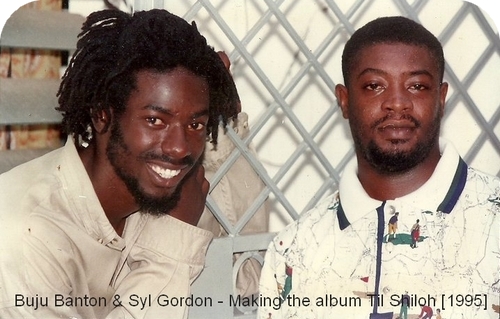Interview with ... Syl Gordon
The owner of Cell Block recording studio and 321 Strong label is one of the most recognized engineers in Jamaica.
He toured with Shabba Ranks and Buju Banton and has worked for the most part of his career with the major studios and labels like Music Works, Two Friends, Black Scorpio, Xterminator, Bobby Digital, One Blood and Penthouse Records naturally.
Return on his career and his collaboration with Donovan Germain's label in the early 90's. (December 2011 - penthouserecords.free.fr) |
|
You started your musical career as an engineer at Music Works. How and when did you get connected with the owner of this studio Gussie Clarke ? Living in the same community with Gussie Clarke, I remember going to Music Mountain Recording Studio in the early 80's with Mr. Clarke. He was working with the Mighty Diamond’s Get Ready album. So in the summer of 1987, I got my first job as a junior clerk at Gussie's renowned Music Works Recording Studio. During this time, I met many artists such as the late, great Dennis Brown and Gregory Isaacs, J.C. Lodge, Dean Fraser and others. I became inspired by them which motivated me to get involved in the music production business. Your first experience in this studio allowed you to work with talented engineers like Soljie, Steven Stanley, Bobby “Digital” Dixon and Peter Chemist. What did they bring to you ? By 1988, I became an apprentice audio engineer learning from heavy weights such as Soljie Hamilton, Steven Stanley, Bobby Digital, Peter Chemist and Courtney Small, and so talented and hard working was I, that within the same year I became one of Music Work's finest Chief Audio Engineer. I contributed and played a vital role to the success of Gussie Clarke’s Music Works Records, Mikey Bennett & Patrick Lindsey’s Two Friends Records, Phillip Fattis Burrell’s Exterminator Records, Junior Reid’s One Blood Records and Donovan Germain’s Penthouse Records. Fall 1993, you launched your Cell Block studio and label with Buju Banton. Tell us about the identity of your label and its singularity. I have developed and established an international clientele which covers the globe during my career, so in 1993 I decided to start my own recording facility. At that time I was a freelance engineer at Penthouse Studio and also touring with Buju Banton as his front house engineer. With similar aspirations, Buju Banton joined my capital venture program and the CB321 Record Label was launched. I maintain my professional standards as I continue to work with outstanding musicians and artists.  Some time later Buju left Cell Block. Yes, the partnership lasted for two years then Buju moved on to form his own company in 1996. You are a mixing and recording engineer, but you worked with other engineers for your own label like Stumpy or Colin “Bulby” York. With this choice ? We are all professional engineers so we chose to work with each other on my project because of the volume of songs the label were producing. When and how did you get connected with Donovan Germain ? I have known Donovan Germain from the early 80's from when he had produced Audrey Hall hit single “One dance won't do” and Freddie McGregor hit single “Just don't want to be lonely”. A few years later both Music Works and Penthouse Studio were located at 56 Slipe Road. By 1990, I had established as a free-lance audio engineer so after returning from Shabba Ranks world tour, Germain hired my services both as studio and live show engineer for his company. You mostly did the night shift at Penthouse studio. Could you describe what the studio was like in this erea ? While working at Penthouse studio, I recorded and mixed mainly for Penthouse clients on the night shift but occasionally work on Germain's productions. For six years both studios at 56 Slipe Road worked on a 20 hours shift, satisfy their clients musical needs. Do you remember songs or riddims produced by Germain on which ones you occupied the function of engineer ? In fact those sessions yielded song such as Beres Hammond “Tempted to touch”, Buju Banton & Beres Hammond “Who say”, Buju Banton “Loving was a crime”, Cutty Ranks “Lethal weapon”, Tony Rebel “Rebel with a cause”, Thriller U “Vanessa”, just a few names which I remember now.   What is Donovan Germain's singularity comparing to other producers ? Donovan Germain had a good ear for good music. He loved to experiment with talented artists and he helped nurture the careers of many. Why did you stop working for Germain ? As Cell Block Recording Studio flourished, I went on to establish my own Cylton music publishing & distribution. Are you still in touch with the other Penthouse engineers, musicians and artists ? I continue to work and am in touch with a regular convoy of musicians, engineers and artists to access my production services. You have been in the reggae industry for a long time. What is your opinion about the evolution of the jamaican music over these years ? I remain quietly confident that the new phase in the development of Jamaica music will continue to grow and achieve similar success. How a reggae producer can make money in these tough economical times for the musical industry ? Honestly, I’am not sure. But those of us who continues to pursue a career in the music business as music producer are doing so out of the love of it. To conclude, what are your plans for future works ? Continue contributing to the progress and the establishment of new artists.  |

